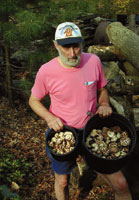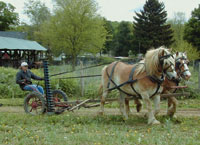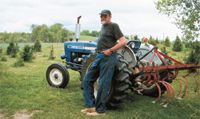Garden State organic farmers harvest fruit from the fertile valleys and hills of the Skylands. They care about the wholesomeness of the food they grow. They go for the unusual, the taste, the heritage, the quality. They find fun in variety and appearance, and feel safe knowing that what they eat and sell for others to eat is not genetically manipulated. Because they don't rely on chemical fertilizers and pesticides to protect their plants, they rely on the land and treat it with respect. Some sell at market, others sell from a stand. Some share their bountyalong with the risk of poor yearswith farm co-op members. Here is a handful of farmers, each planting to a different drum. Skylands visitors and residents can enjoy them all.
Since 1987, Upper
Meadows Farm has been devoted to sustainable holistic agriculture. Joining
the Certified Organic community in 1991, the farm has maintained certification
by NOFA-NJ ever since and has grown from 4 1/2 acres to the current 153 acres,
all certified organic. The farm has raised pigs, sheep, goats, rabbits, chickens,
turkeys, and cattle, for meat, fur, fiber, eggs, and milk. Vegetable production
has expanded from the traditional "kitchen garden," which remains
as one of the fields, to approximately 10 acres today, that serves their CSA
as well as other markets. CSA (Community Supported Agriculture) farms are small,
independent growers who, by establishing a guaranteed market through prepaid
annual sales, can focus on quality produce. CSA’s offer a healthy, local
alternative to large-scale, industrialized agriculture. Upper Meadows practices
organic agriculture, avoiding pesticides and inorganic fertilizers. Shares
are competitively priced by lowering the cost of distribution.
We are gradually expanding our fruit capabilities and planted 37 fruit trees in 2003. Berries are also plentiful including blueberries, which we last had available in 1994 and a raspberry patch. New grape varieties are planned to augment the concord vines. And an additional 1/4 acre is devoted to perennial flower production.
"We make hay when the sun shines" says owner Len Pollara, "and rotate our grain crops, which have been oats, wheat, rye, spelt, flax, buckwheat, and corn. All our livestock products are pasture based and we are always working to improve and expand our pasture. We anticipate being able to offer fresh pork again in 2006. We have several very busy beehives and have raw honey available year round while supplies last. We also have maple syrup courtesy of our trees with a measure of hard work added for flavor." 973-293-8171.
Jean Boggia sells produce to epicures and other food fanciers. For three years now, she's been harvesting home-grown organic lettuces and other delights from her private garden-gone-workhorse at her home in Lebanon. Her Kitchen Garden and Rock Farm was first considered as a means of support for retirement, but retirement got further away. "I though I'd better start now." She turned a rocky one-quarter acre plot with a 50-foot buffer zone in all directions.
Boggia says it's in her blood to farm and do things with food. Her grandfather was a successful market gardener. "It just made sense not to use a lot of chemicals. It also tastes better. If I want to sell it to the public, I want to be able to prove to people it is organic." And prove she does. Boggia passed all the tests for certification as an organic farm with Northeast Organic Farming Association of New Jersey (NOFA), but it wasn't easy. First she contacted them for guidelines and at the end of her first year, filled out an extensive application, including affidavits from neighbors, and paid a fee. They sent an inspector who checked seed orders, receipts for soil amendments, storage facilities, the garden, and searched for chemicals. Then, a committee met to decide if she was organic or transitional organic. "I never used anything in the yard, so I was able to be certified right away."
In her second year, she submitted a conservation plan, guided by the Natural Resources Conservation Service (NRCS), with her next application. And every three years, she tests her water for nitrates and e-coli, and tests soil for fertility and health. General inspections, which includes checking to see that sales jibe with seed purchases, occur yearly with each application. To make things more interesting, certification is ultimately federal which dictates that compost be documented with information on ingredients, temperatures and frequency of turning. And she must use certified organic seed if it exists for what she wants to plant.
But this doesn't daunt Ms. Boggia, who plants mostly heirloom tomatoes by the dozen in raised beds, along with seven varieties of potatoes -- one that's purple all the way through -- green and yellow beans with purple stripes, French and Egyptian zucchini, fancy greens and five kinds of melons in addition to her more usual goodies.
"I don't always love the hard work with sweat dripping off my nose and bugs in my ears. I love it when I'm harvesting the good stuff." Food lovers can find Boggia's "not cheap veggies" at the Madison Farmer's Market (Madison High School on Ridgedale Avenue, 973-377-1818) in July and August.
 Some
farmers don't like the new federal rules. They choose to not be certified
by NOFA, but continue to grow food organically the old-fashioned way without
chemicals. One is Rich Sisti of Catalpa Ridge Farm,
Wantage. Sisti hesitates to call himself an organic grower because,
he says, the government owns the word organic now. "In order to
be organic, it's a governmental thing. It's a little complicated." Sisti
did not reapply for NOFA certification because the new regulations
put into action last year require that he use certified organic seed.
Although he uses it most of the time, he grows some hybrids and plants
seed of unknown origin that members bring from trips to Europe, like
bi-color escarole and striped lettuce. "I grow everything old-style
organic. I don't use chemicals and I haven't sprayed anything in years."
Some
farmers don't like the new federal rules. They choose to not be certified
by NOFA, but continue to grow food organically the old-fashioned way without
chemicals. One is Rich Sisti of Catalpa Ridge Farm,
Wantage. Sisti hesitates to call himself an organic grower because,
he says, the government owns the word organic now. "In order to
be organic, it's a governmental thing. It's a little complicated." Sisti
did not reapply for NOFA certification because the new regulations
put into action last year require that he use certified organic seed.
Although he uses it most of the time, he grows some hybrids and plants
seed of unknown origin that members bring from trips to Europe, like
bi-color escarole and striped lettuce. "I grow everything old-style
organic. I don't use chemicals and I haven't sprayed anything in years."
He underplants garlic and onions with red mustard and Italian arugula and thinks it might be a good way to rotate crops. The garlic comes out in July, so he'll plant oriental greens and carrots to plume above them. They're sweetest in the fall anyway. He grows 30 varieties of garlic and 46 varieties of heirloom tomatoes, including "Red Peach," a medium-sized fuzzy-skinned tomato. "I like to say it looks like the morning dew on it."
His 15-acre farm is a strange operation. "A little patch here and there, fences, a lot of things going on." Sisti grew up in Paterson and took a "Future Farmers" agriculture course in high school. "I had a pig." Now he has fava beans, artichokes, heirloom squash, Belgian white carrots, Austrian lettuce speckled like a trout... He's looking for spinach from Formosa and Japan to do better for him in the spring.
"I'm allowed to do anything weird in the world. With a CSA (Community Supported Agriculture), I deliver and they take," he says of his members in Hoboken and the Vernon Valley. "I do oriental greens, red turnips, black tomatoes." He even delivers lamb's quarters, purslane and pig weed to his devoted clientele who love it. Gastronomes can find Rich Sisti's fancy food at the Sussex County Farmer's Market in Olde Lafayette Village, Lafayette, and on occasion at events. In August, he'll share his wares throughout the state at Ramsay Day, the Sussex County Farm and Horse Show, The State Fair, and Hoboken Day.
Sisti tips: Plant spinach in the fall for a good crop. Eat those chive flowers. So, does he like it? "Sometimes I'm happy. I fell on my head when I was a baby. It's a challenge."
Karen Anderson, executive director of NOFA, says that the organization supports farmers like Sisti who is still a member. She says NOFA works in a continuum of sustainable practices that includes organic grass-based agriculture pasture-raised poultry, beef and dairy and biodynamic farms. "We're on the green side of the spectrum."
"There's no turning back from the new regulations. We'll serve an important function in situations where there are processed food products from the south or abroad." Anderson says that thanks to farm markets, farmers here have the luxury of being face to face and being able to explain to people how they grow their produce. "Farmers with a face" she calls it. In many places, consumers don't get to meet farmers and must rely on labels.
"We're the granddaddy of all eco-labels. The most developed and highly defined and widely recognized labeling, it will always be a really important part of what we do." Label requirements are a guarantee that minimum standards have been followed. NOFA's membership represents the breadth of the food system consumers, chefs, farmers, home gardeners. It's an opportunity to support sustainability in agriculture. People who buy organic use their food dollars as a vote for organic agriculture.
 The
sawed-off limbs of oaks are piled and crossed four feet tall -- apartment
buildings for shitake mushrooms at Oak Shade Farm in
Denville. In the creases where the logs join in moisture and shade,
the fungi proliferates. Alex Adams, shitake proprietor, cuts select
red and white boles 42 inches long with a six-inch diameter for their
straight grain and density. It's all for the mycelium those
reaching, branching, grabbing fungus roots. He says they find life
easier to run with the grain, so colonization is more successful. Plus,
with all those tight oak cells, mycelium can take its toll on the wood
for a long time.
The
sawed-off limbs of oaks are piled and crossed four feet tall -- apartment
buildings for shitake mushrooms at Oak Shade Farm in
Denville. In the creases where the logs join in moisture and shade,
the fungi proliferates. Alex Adams, shitake proprietor, cuts select
red and white boles 42 inches long with a six-inch diameter for their
straight grain and density. It's all for the mycelium those
reaching, branching, grabbing fungus roots. He says they find life
easier to run with the grain, so colonization is more successful. Plus,
with all those tight oak cells, mycelium can take its toll on the wood
for a long time.
He likes his logs fresh cut. That way, he colonizes them with the kind of fungus he wants, namely shitake, instead of some weedy one moving in first. "You want your favorite stuff to colonize your logs." The shitake log condos stand in the shade on the edge of the woods in Adams's backyard. He keeps them till they're punky usually a year of production for every inch in diameter -- then tosses them out to rot with other old vegetation. Adams has brought them back though, when he found them still fruiting after all these years.
But first he drills holes in a fresh log. He digs in a clear plastic bag filled with what looks like lumpy sawdust, white flour and mold. It's close. It's spawn, a mix of sawdust and oat bran, colonized by shitake mycelium. He packs the holes with spawn in a plunger, then covers it with a small piece of foam to keep moisture in spawn mulch. He puts the log on a stack or in a sheltered place under the trees so the spawn will colonize it.
A prime shitake has white flesh peeking through cracks in its dark brown skin, denoting growth over a long time, turbulent times of sun and rain when they get tough, then crack from moisture. Adams is picky about his mushrooms. He likes the margins to be in-rolled a little. He says it shows the shroom didn't go to spore on the log, and it protects the gills from bruising. Size matters in shitake saleability. He even cuts off most of the stems so customers get the very best.
 At Asbury's
Natural Village Farm in Asbury, Warren County, Farmer Charles
Napravnik drives his team of Belgians through the flower-covered
fields where he's out working some steam off the horses before they
all start mowing the tall grass. Napravnik manages the 12-year-old
organic CSA much like the farmer before him except for using Tom
and Ben, equines. He grows no favorites. "I like it all."
At Asbury's
Natural Village Farm in Asbury, Warren County, Farmer Charles
Napravnik drives his team of Belgians through the flower-covered
fields where he's out working some steam off the horses before they
all start mowing the tall grass. Napravnik manages the 12-year-old
organic CSA much like the farmer before him except for using Tom
and Ben, equines. He grows no favorites. "I like it all."
Seeming to relaxe in his sulky-like seat as the horses nudge and rub each other's faces, he says "They're friends in a world of people. " He likes using the horses and the mule Bunny to mow, plow, cultivate and plant some things like corn. "It's more fun for me." Today he cuts grass that he'll plow in for green manure as nearby, a volunteer digs weeds out of strawberry rows and the free-ranging red hens scurry, laying brown eggs so big they hardly fit the carton.
Napravnik got started in farming in the '60s during the back to the land movement. He learned from the Amish, then took the position as farmer on this 15-acre, NOFA-certified farm two years ago. "I love farming and I love the horses. I want to grow real food for real people. It's a good thing to do. It's good for the land. It's a feeling of accomplishment to see the stuff grow. It's a passion to farm. It's very fulfilling."
The CSA is accepting members to share the bounty and possibly work. Napravnik's own farm market, also NOFA-certified, will open in late June in front of the farm at 10 Asbury-Bloomsbury Rd., Asbury. Call 908-537-2846.
This organic vegetable operation is run by Les and Debbie Guile in Augusta, just north of Newton.
Every one of the farm's ten acres has an important purpose. Walnut Grove derives its name from the one acre of walnut trees growing here when the Guiles purchased the land in 1981. They began a small garden a year later, and, by 1983, were selling produce to the public. Eventually, in 1993 and 1995, the Guiles gave up jobs as a printer and a teacher to pursue organic gardening full time. There are now three acres in vegetables, three acres in Christmas trees, and three acres utilized for wildlife habitat. The only "farm animals" are two friendly felines that have the run of the farm.
Organic farming employs many of the same principles of conventional agriculture while stressing soil sustainablility and stewardship of the land. This farm is re-certified annually by the Northeast Organic Farming Association of New Jersey (NOFA) at a cost of $300 to $500 per year paid by the farmer. Daily records must be kept of the farming procedure, including how much manure and fertilizer are used and crop rotations. No insecticides or fungicides are used on any of the fields. Walnut Grove has been an organic farm since 1983 and certified organic since 1991. Les and Debbie manage the farm on their own with seasonal help from volunteer friends and apprentices from Rutgers Cooperative Extension's Master Gardener Program and NOFA.
The Guiles grow a variety of crops; between 50-60 different vegetables and flowers each year. Fresh garlic, an item hard to find elsewhere in the area, is a specialty. Also on the vegetable list are melons, tomatoes, peppers eggplant, sweet corn, beets, carrots, leafy greens including Swiss chard, arugula and kale, mustard greens, kohlrabi, cabbage, broccoli and many types of squash including winter squash and pumpkins. A drip irrigation system keeps the vegetables happy during the heat of summer. Walnut Grove is an all season farm offering cut-your-own Christmas trees in December including spruce, balsam fir and pines.
 Walnut
Grove is at the corner of Rt. 519 and Augusta Hill Rd. just north of
Newton. Hours of operation are Wednesday through Sunday, 9am to 7pm,
mid May to the end of October for vegetables and flowers. The farm reopens
from the Saturday after Thanksgiving through December 20 for Christmas
trees.
Walnut
Grove is at the corner of Rt. 519 and Augusta Hill Rd. just north of
Newton. Hours of operation are Wednesday through Sunday, 9am to 7pm,
mid May to the end of October for vegetables and flowers. The farm reopens
from the Saturday after Thanksgiving through December 20 for Christmas
trees.
To find more organic farms, please contact Karen Anderson at 609-737-6848 or click on Northeast Organic Farming Association.